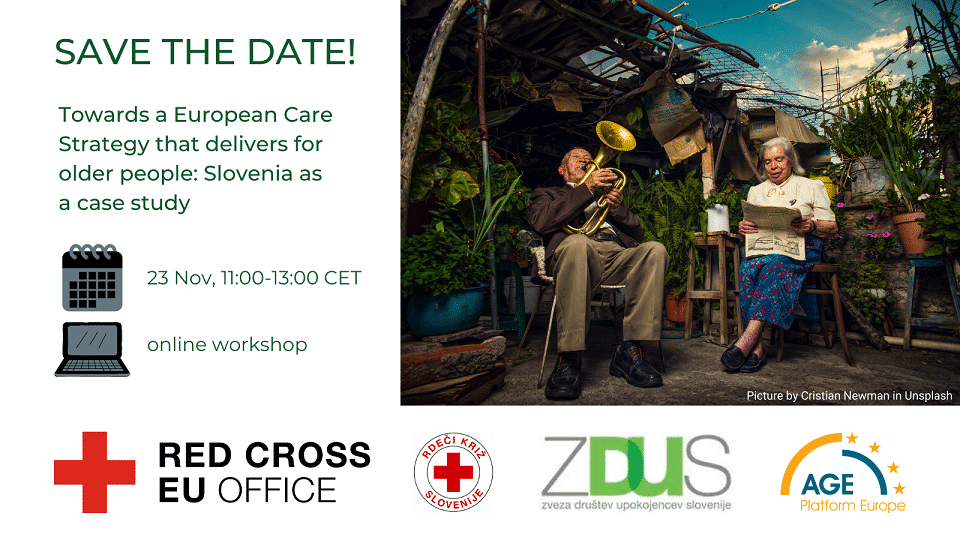As part of the wider reflection on ageing, initiated by the launch of the EU Green Paper on Ageing, the European Commission is preparing an EU Care Strategy to help address current and future challenges and opportunities in the care sector. This is why we co-organized, together with the Red Cross EU office, the Slovenian Federation of Pensioners’ Associations and the Slovenian Red Cross, an online workshop “Towards a European Care Strategy that delivers for older people: Slovenia as a case study” on 23 November 2021.
As the 2021 EU Long-Term Care Report points out, there are aspects of care systems that require urgent attention. These include insufficient access to care, which particularly affects older women who live longer and tend to have lower income levels. Quality issues are also prevalent, in the lack of a shared European understanding and adequate quality monitoring mechanisms.
“COVID-19 showed how inadequate our long-term care system is. We need an ambitious EU Care Strategy based on human rights, quality, affordability, universality, and that offers high-quality job opportunities and support to carers”, said Maciej Kucharczyk, AGE Secretary General.
A life-course approach is needed to promote healthy lifestyles at all stages of life and support active ageing, pointed out Mette Petersen, Director of the Red Cross EU office. She further called for strengthening community-based care for older people and support their social inclusion and participation.
Enabling older people’s participation is precisely for AGE what should be the ultimate goal of care.
“We want care that supports individuals to remain included and participate in society, at all stages of life. Services should not be the end goal, but the means to achieve integration and inclusion”, highlighted Borja Arrue, AGE Policy Officer. “These are the key messages of our internal Re-thinking Care process, carried out with our members”.
The perspective of carers were also brought forward, in particular the difficult working conditions and low salaries for people working in the care sector. This has contributed to staff shortages, increasing an over-reliance on informal care work, which incurs social and economic costs that are often overlooked. Recalling the important share of care provided by informal carers, Stecy Yghemonos from Eurocarers insisted that they should complement professional care, not the other way around. “Professional and informal care are two sides of the same coin”, he stated, this is why the EU Care Strategy must address both aspects to ensure choice and dignity for all care users and their informal carers across Europe. He further called for an EU quality framework and vision for long-term care that is co-produced with care users and providers.
Useful links:
- You can read here a more detailed report of the event and here the joint AGE – Red Cross conclusions
- Watch the recording of the event
- Read also:
- our Policy Paper on Care: Care must empower us throughout our lives
- our October Special Briefing: European Care Strategy – The EU as a driving force for better care for all?








